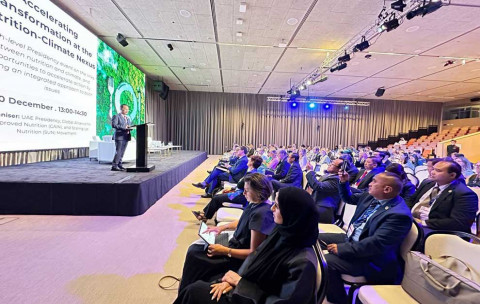
Soeung Saroeun, executive director of the NGO Forum on Cambodia, presents a copy of the Environmental, Social and Corporate Governance (ESG) Compliance report. NGOF
Fair Finance Cambodia (FFC), a coalition originally created to help secure funding for the well-being of the country’s most vulnerable, has recently published a comprehensive study titled “Environmental, Social and Corporate Governance (ESG) Compliance” on the gold mining industry in the Kingdom.
The study offers recommendations to government institutions to ensure inclusive and environmentally-friendly gold mining investment.
In a December 20 joint press release issued by FFC, the Oxford Committee for Famine Relief (OXFAM) and the NGO Forum on Cambodia, the study’s aim was to enhance understanding of the existing ESG-related policies, regulations and practices in gold mining investments in the country.
The press release stated that the study also aimed to provide practical recommendations for addressing challenges related to ESG performance in the mining sector. These challenges include issues related to human rights, gender, health and safety and the well-being of indigenous people.
It mentioned that, given the central role of the extractive industry in generating national revenue, its importance is increasing as the country aspires to become an upper middle-income country by 2030.
According to the press release, it is crucial to ensure that economic growth does not compromise the country’s natural resources and environmental health. Therefore, adopting ESG practices in the expanding industry is currently of utmost importance.
Soeung Saroeun, executive director of the NGO Forum, praised and urged the responsible government agencies, particularly the Ministry of Environment and the Ministry of Mines and Energy, to fulfil their legal and institutional obligations in managing, monitoring and auditing gold mining practices and companies.
“It is essential to ensure strict compliance with regulations and standards to protect both the natural and human ecosystems. Embracing ESG principles, a globally recommended approach, can assist both the government and private sectors in understanding the associated impacts and promoting responsible practices,” he stated.
“Several policies and sub-decrees, including the Environmental and Natural Resource Code, the Law on Mineral Resource Management and Exploitation and the Forestry Law, have been effectively implemented,” the press release stated.
The study presents five broad policy recommendations for the government and regulators.
According to the report, it is crucial for the environment and energy ministries, and other national and sub-national authorities to enforce regulations, particularly in problematic mining projects.
It said both bodies should collaborate to develop a comprehensive policy and guideline for integrating ESG in the country’s mining industry. A minimum standard for gold mining should be established to ensure compliance with labour and community rights, gender equity and environmental considerations.
It went on to state that the energy ministry should create a publicly accessible database of gold mining companies, including corporate profiles, licenses, reports and financial statements. The practices of Renaissance Minerals (Cambodia) Ltd (RNS) and Angkor Gold Corp (ANK) were cited as models for other companies.
They were also urged to develop a more effective grievance and redress mechanism to address concerns raised by stakeholders, particularly local communities.
The study indicated that the energy ministry should continually update and disseminate information about the environmental and social funds associated with gold mining projects to all relevant parties through its website or periodic announcements.
It concluded by stating that the ministry should enforce strict requirements for the declaration or reporting of funds or capital investment in gold mining operations in-country.
Environment ministry spokesperson Phay Bunchhoeun was unavailable for comment on December 20.
However, during the “Mining and Energy Policy in Cambodia” forum in November, energy minister Keo Rattanak stated that under the new government’s policy, the country would not grant any mine resource licences, except for two approved by the previous mandate.
He added that the competent authority would consider reducing land already studied and land with no potential for mining business.
“We will not allow for the expansion of mining land,” he stated.




















